1908 National League Playoff -Chicago Cubs @ New York Giants
Start by reading newspaper accounts from the time that tell the dramatic events, starting with "Merkle's Bonehead Play," that led to the playoff game for the National League pennant.
The September 23 "Merkle Game" that ended in a stalemate left New York and Chicago tied for first with the Pittsburgh Pirates just a game behind.
The three clubs stayed neck-and-neck down the stretch, each holding the top spot for a day or two until the trio were tied again after the games of October 1. The Cubs and Pittsburgh Pirates have identical 95-55 records (.633) with the Giants at 94-54 (.635). Chicago and Pittsburgh have four games left in the 154-game schedule while New York has six remaining.
Friday, October 2
The Pirates sweep a doubleheader at St. Louis to run their winning streak to eight.
The Cubs win in Cincinnati 5-0.
The Giants defeat the Phillies in Philadelphia 7-2.
Standings: Pittsburgh leads both the Chicago and New York by 1/2 game.
That evening, National League President Harry Pulliam finally renders his decision on the disputed September 23. He upholds the umpires' ruling of a tie game that could not be continued because the field could not be cleared of fans celebrating what they thought was a Giant victory.
Saturday, October 3
The Pirates beat the Cardinals for the sixth straight time.
The Cubs complete their sweep of the Reds, 16-2.
The Giants lose to the Phillies 3-2 as Harry Coveleski outduels NY's ace Christy Mathewson.
Pittsburgh leads by a half game over the Cubs with the Giants 1.5 back. However, McGraw's club is not eliminated since they still have three games with the Boston Doves.
Sunday, October 4
Since the City of Brotherly Love does not allow baseball on Sundays, the Giants are idle.
The Pirates travel to Chicago for their 154th and final game. It is #153 for the Cubs. A record crowd of 30,247 at the West Side Grounds sees the Cubs win 5-2.
The Cubs leap frog the Pirates to lead by 1/2 game. The Giants trail by 1 1/2. With Chicago finished its schedule, the only chance the New Yorkers have is to win their remaining three games against the Doves at the Polo Grounds to tie the Cubs.
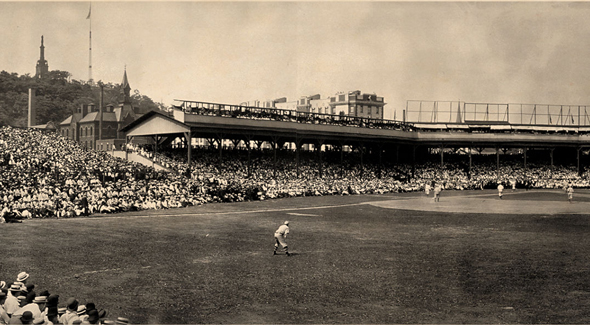
Cubs vs Pirates October 4
And that's exactly what the Giants do, sweeping the Doves 8-1, 4-1, and 7-2. The standings look like this.
| Team |
W |
L |
% |
GB |
| Chicago Cubs |
98 |
55 |
.641 |
-- |
| New York Giants |
98 |
55 |
.641 |
-- |
| Pittsburgh Pirates |
98 |
56 |
.636 |
1/2 |
So the controversial Merkle game must be replayed Thursday, October 8. It is in effect a one-game playoff for the pennant and a trip to the World Series against the Detroit Tigers. The Pirates, their schedule complete, are eliminated because they will finish one game behind the winner and tied for second with the loser.
Anticipating a Giant victory in the final game in Boston, the sixteen Cub players - including player-manager Frank Chance - along with club president Charles Murphy, his treasurer, and newspaper reporters leave for New York at 2:30 PM October 7 to a rousing sendoff by hundreds of fans.
The Chicagoans make the trip in style in a special car on The Twentieth Century, the fastest train ever ridden by any ball club. In addition to cutting ten hours off the normal running schedule, the Limited is known for amenities such as maids, barbers, manicurists, valets, and a dining car that can compete with the top restaurants in New York or Chicago. The delegation arrives in Manhattan shortly before 10 AM for the 3 PM game.
The Cubs disembark on a beautiful fall day into a city of 4,000,000 that is seething with animosity and focused on the game at the Polo Grounds. Animosity because the September 23 game was "stolen" from their beloved Giants on a "technicality." Focused because scores of New Yorkers are skipping work or school to watch the game any way they can, either in the park or from vantage points outside the stadium. Thousands of Giants fans greet them "with vile names and obscene language." C Johnny Kling recalled: "They called us everything they could think of and some things we have never heard before." Ace P Mordecai Brown and 2B Johnny Evers (who realized Merkle had not touched 2nd as the apparent winning run scored September 23) have received death threats as well as Johnny's mother.
About the time the Cubs arrive at Grand Central Station, Christy Mathewson, John McGraw's obvious choice to start the all-or-nothing game, tells his wife, "I'm not fit to pitch today. I'm dog tired." He has pitched a league-leading 383 innings in 43 starts and 12 relief appearances. Even with four days rest, his longest respite in weeks, his arm still feels dead. Nevertheless, the consummate warrior tells his manager when he arrives at the ballpark, "I'll go as far as I can."
McGraw is concerned about the health of his team. His 2B Larry Doyle was spiked September 8 and just as he was set to return, he slipped and hurt his ankle. RF Mike Donlin is also hobbled by a bad ankle. C Roger Bresnahan hurt himself sliding and can barely run. 1B Fred Tenney is bandaged from the waist down. LF Moose McCormick and CF Cy Seymour play in pain, and SS Al Bridwell's spike wound has not healed.
But Mugsy will get no sympathy from Chance, whose Cubs have suffered as many injuries or more. Every starting outfielder missed at least 40 games. 2B Johnny Evers played in only 126 games, as did Kling. The manager participated in 129 contests. Fortunately, the starting rotation remained durable, four of them appearing in 33 or more games.
Giants President John T. Brush hires 50 special policemen to go with the 300 police and five mounted men assigned to the game by the Police Commissioner. To counteract scalpers, Brush decides to have no advance ticket sales and to wait until 11 AM to open the box office. The strategy is partially successful at best. Over 5,000 people are in line by 10 AM. The game is sold out by noon, including seats in the partially completed addition to the grandstand that will eventually seat 2,500. Dozens of fights break out as ticket holders push their way through the throng into the park. Hundreds of fans are battered. Many without tickets get in, and many with tickets don't before the gates to the Polo Grounds close at 12:45 by order of the police. More altercations occur when men who purchased a ticket from a scalper realize they've wasted their money and track down the speculator. Half a dozen ambulances are dispatched to the scene, each loaded with doctors. Numerous spectators are hauled out of the stadium and conveyed to the West 153d street police station. About 2 PM, frustrated fans topple a 75' section of fence. Thousands surge through the gap into the park despite getting soaked by firehoses. Thepolice finally stop the intrusion.
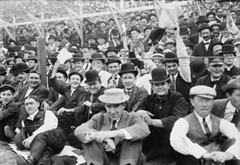 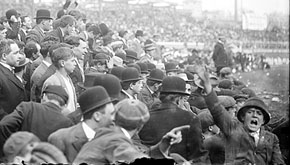
Crowd inside the Polo Grounds
The writer for the New York Evening Telegraph estimates the crowd "surging in and around the Polo Grounds" to be "fully a quarter of a million" - "the largest crowd ever gathered in the world for a sporting event." He adds, "There were fully twice as many persons immediately outside the fence around the grounds as there were inside, and every foothold and balancing handhold on structures of every kind with even a glimpse of the grounds was fiercely held against any newcomer. From the press box the skyline everywhere was human heads. They were located on grandstand, roofs, fences, 'L' structures, electric light poles and in the distance on smokestacks, chimneys, advertising signs and copings of apartment houses." Another report says, "For nearly a mile there was a mass of people lining stairs, viaducts, streets, Speedway, bluffs, crags, rocks, peaks, grass, plots, trees, and any other available space ..." Two die and more are injured in falls from precarious perches that allowed them to see into the stadium.
Thousands climb up Coogan's Bluff, a promontory overlooking the Polo Grounds from beyond the 1B grandstand. Fans watch every Giant game for free from up there, but today the number is so large that not all can see, which causes more jostling when one of the regulars finds someone else in his usual spot. The crowd inside and outside the Polo Grounds included an unprecedented number of women.
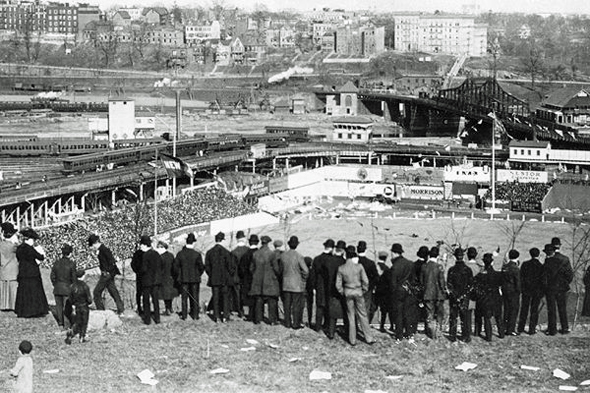
Fans watching the "Merkle Game" from Coogan's Bluff This ad appeared in the Chicago Tribune the morning of the game.
Interest in the game extends to all the cities in the National League. Trading in the New York Stock Exchange drops to a snail pace as game time approaches. So many fans crowd around scoreboards and newspaper offices in Pittsburgh that commerce and the streetcars come to a standstill. In Boston, the Red Sox set up a scoreboard at their ballpark. In Washington, work on the presidential election campaign is set aside for the afternoon. |
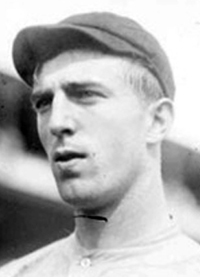
Fred Merkle
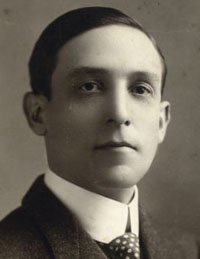
Harry Pulliam
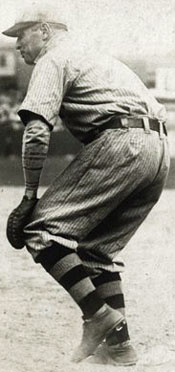
Frank Chance
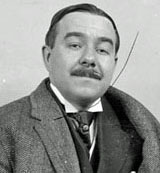
Charles Murphy
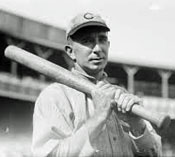
Johnny Kling
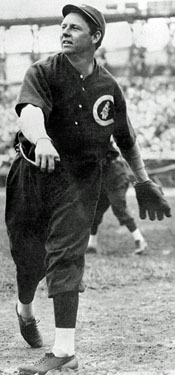
Mordecai "Three Fingered" Brown
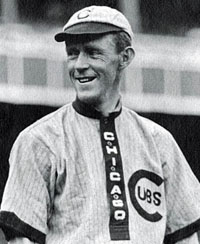
Johnny Evers
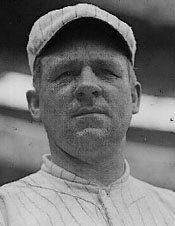
John McGraw
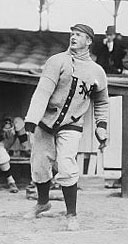
Christy Mathewson
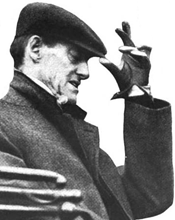
John T. Brush
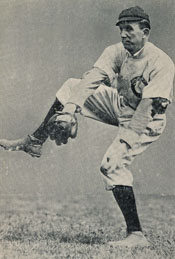
Jack Pfiester
|
Fearing trouble, the Cubs don't come to the stadium as a team. One by one they get off the "L" train, quietly make their way to the visiting clubhouse, and don their uniforms. The crowd fails to recognize any of them in street clothes.
Chance decides to start lefty Jack "The Giant Killer" Pfiester instead of Mordecai "Three-Finger" Brown. Frank believes that Jack with his sidewheel delivery will be more effective against the Giants than the righthanded Brown, who won the crucial game against Pittsburgh the previous Sunday. However, Mordecai will be ready in the bullpen from the start of the game.
Like Mathewson, Brown is weary from pitching in 11 of his club's last 14 games.
Ironcially, Chance's decision sets up the same pitching duel as in the Merkle game 15 days earlier. Pfiester had started his rookie season with three straight losses to the Giants, although one was only 1-0. His nickname "Giant Killer" came from four straight starts against New York in August when he gave up a total of only three runs. He won the first three with the fourth being the 1-1 tie in the Merkle game.
When the Cub skipper emerges from the clubhouse in RF and lopes toward the infield, the crowd yells "Robber!" "Bandit!" But the " Peerless Leader" smiles pleasantly through it all.
Brown, right behind his manager, also ignores the insults verbally hurled his way.
Brown recalled: "I never heard anybody or any set of men called as many foul names as the Giants fans called us that day from the time we showed up till it was over."
The appearance of Giants manager McGraw provokes quite a different reaction. He has to doff his cap to quiet the applause.
Larry Doyle is the first Giant regular to make an appearance and is shortly followed by Fred Merkle, who has played in only four games since his notorious blunder. Instead of catcalls, Merkle is greeted by silence. Nobody has the heart to jeer him.
A nervous wreck, Fred has lost weight the last two weeks.
The contentiousness between the teams flares up in pregame warmups. Because of the restless, unruly crowd, New York management decides to move up the start of the game 15 minutes. With the canvas tarpaulin removed from the field, the Giants complete their full allotment of 20 minutes for batting practice. Then the Cubs take their turn amid shrieks of "Oh, you robbers! You brigands!" But after only five minutes, McGraw sends his team out for fielding practice, in effect taking the 15 minutes lost by the earlier start time out of the visitors' batting practice period. Chance objects strenuously because his club has not played since Sunday and has just traveled 1,000 miles. When Giants P Joe McGinnity steps to the plate to begin hitting grounders to his infielders, Chance tries to push him away, and McGinnity steps on his toes and even spits in his direction before raising his bat menacingly. Realizing that he would play into McGraw's scheme if he got himself ejected before the game begins, Chance backs away as players from both teams rush in, surround the belligerents, and end the incident, which had a good possibility of starting a riot. Chance can't complain since he told his men before they took the field to each choose a Giant to pick on. "Call 'em everything in the book."
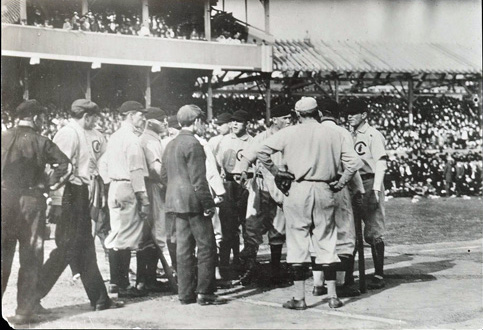
Dispute at home plate before the start of the game
After the team leaves the field, the grounds crew puts the finishing touches on the playing field as several policemen station themselves around the Cubs dugout. The starting pitchers finish their warmups, Mathewson telling his catcher, Roger Bresnahan, the same thing he told his wife earlier. "I haven't got anything today."
The attendance is estimated at 35,000 to 40,000. Vendors hawking peanuts, hot dogs, and beer are having a banner day. Thousands stand behind ropes in front of the outfield wall from one foul line to the other. Fair balls hit into the standees will be ground rule doubles. The normal Polo Grounds dimensions of 335' down the lines and 500' to dead CF will be considerably shorter today.
At precisely 2:45, the umpires take the field - Bill Klem behind the plate and Jim Johnstone on the bases.
Klem, who spent 37 years in the majors, called the Giants-Cubs 1908 playoff game his most exciting day in baseball. Yet he is uneasy before the game. The day before, Giants team physician Joseph Creamer offered him $2,500 (about Klem's salary for the season) to tilt the game toward the home team.Johnstone had also been approached twice by gamblers with similar offers. The morning of the game, Klem reports the bribe attempts to President Pulliam and asks for new umpires to be assigned. But Pulliam refuses for logistical reasons. He has only four other umpires, and all are too far away to make it by game time. As Klem makes his way to the field from under the stands, Creamer approaches again and pushes a handful of bills at him. "Take that, will you, Bill. I hope that my mother may drop dead in the grandstand if I ever mention it to a soul." When Klem brushes him off, the persistent doctor follows the umpire almost onto the field, pleading with him to change his mind. Before heading into the sunshine, Klem turns and says, "I can only umpire one way, and that is to call them as I see them." Creamer would be banned from baseball by Pulliam.
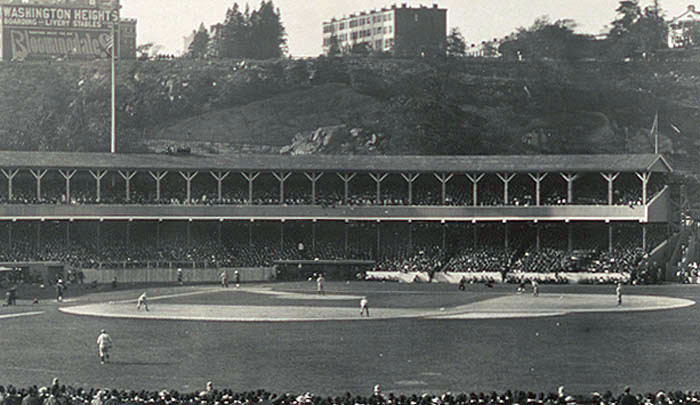
Polo Grounds III
Starting Lineups
Chicago Cubs
| Jimmy Sheckard |
LF |
.233 |
| Johnny Evers |
2B |
.300 |
| Frank Schulte |
RF |
.234 |
| Frank Chance |
1B |
.268 |
| Harry Steinfeldt |
3B |
.241 |
| Solly Hofman |
CF |
.246 |
| Joe Tinker |
SS |
.267 |
| Johnny Kling |
C |
.276 |
| Jack Pfiester |
P |
12-10 |
|
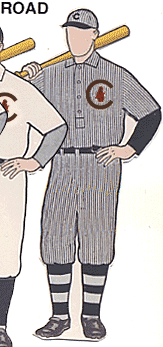 |
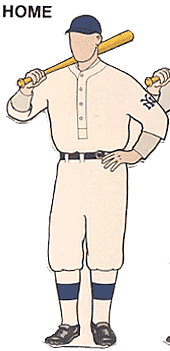 |
New York Giants
| Fred Tenney |
1B |
.259 |
| Buck Herzog |
2B |
.306 |
| Roger Bresnahan |
C |
.284 |
| Mike Donlin |
RF |
.333 |
| Cy Seymour |
CF |
.269 |
| Art Devlin |
3B |
.251 |
| Moose McCormick |
LF |
.284 |
| Al Bridwell |
SS |
.285 |
| Christy Mathewson |
P |
37-10 |
|
1st Inning
- Despite his trepidations, Mathewson disposes of the Cubs quickly. Changing speeds, he strikes out Jimmy Sheckard and Frank Schulte on either side of Johnny Evers grounding out 4-3.
As the Giants come to bat, the sound of a trumpet pierces the din made by horns, megaphones, and human voices. The trumpeter is playing "Taps." The crowd laughs, assuming the song is aimed at the Cubs.
- Pfiester doesn't fare as well in his first inning as Matty. Jack's pitch pitch hits Fred Tenney on the arm, provoking a great roar from the massive throng. Then the rattled southpaw walks Buck Herzog on four pitches. Jack settles down and fans Roger Bresnahan. C Kling intentionally drops the ball and pretends to look for it. Taking the bait on a ploy Chicago has practiced all season, Herzog strays off first and is picked off by Kling's snap throw. To rub salt in Buck's wound, the next batter, Mike Donlin, smashes the ball down the RF foul line for two bases, scoring Tenney. Lost in the hubbub is Chance's yelling that the ball was foul. When Pfiester walks Cy Seymour, the Peerless Leader has seen enough. After a long conference on the mound, probably to give Brown more time to warm up, he makes the call to the bullpen. The crowd goes wild with joy as the dejected ex-Giant killer trudges to the dugout, yelling on the way at Klem for his tight strike zone. But the fans' joy is short-lived. The three-fingered reliever strikes out Art Devlin and strides to the visitors' dugout to a chorus of vile names from the spectator. Giants 1 Cubs 0
A smile can be seen on Fred Merkle's face as he tries to hide behind the water cooler in the home dugout. A Giants victory will reduce his bonehead play to a mere footnote in baseball history.
2nd Inning
- Chance leads off with a single to LF but is immediately picked off on "a lightning throw" from Matty. The Chicago manager argues with Johnstone for five minutes, throwing his cap into the dust and stomping on it. The umpire twice threatens to kick Chance from the game. As Frank finally walks to the dugout, the on deck batter, Solly Hofman, throws his bat on the ground. He has said nothing, but his act is evidently thought more seriously than his manager's, at least by home plate umpire Klem, who kicks Hofman out of the game. Mathewson then records his third and fourth Ks, fanning Harry Steinfeldt and Hofman's replacement, Solly Howard.
- The Cubs defense is on display this half inning. First, RF Schulte helps Brown with fine catches of hard line drives off the bats of Moose McCormick and Al Bridwell. Then SS Joe Tinker makes a fine stop of Matty's hard grounder.
3rd Inning
- As happens about 1/9 of the time, the player who made a fine play to end the previous inning leads off the next inning. Before pitching to Tinker, who has given him trouble in the past, Mathewson waves his CF Seymour further back, but Cy pays no heed. Matty tries to throw a curve low and inside. Instead, the ball sails down the middle of the plate. The Cubs SS smashes it to deep LCF. Seymour gets on his horse and races after the ball and makes a leap for it but just misses a catch that would have been easy had he been 10' further back. Then Cy compounds his mistake with another. Instead of letting the ball roll into the crowd for a ground rule double, he picks it up and throws too late to third to get Tinker. Kling follows with a liner to LF to tie the game. Brown bunts the runner over before Sheckard hits a fly that Seymour, playing where he belongs this time, catches for the second out. But before Matty gets the third out, the Cubs push across three more runs. He pitches carefully to Evers, Chicago's leading hitter at .300, and doesn't mind when Johnny walks to bring Schulte to the plate.
RF Schulte, injured a third of the season, is hitting only .236, by far his lowest average in his four seasons with Chicago. The league leader in triples in 1906 knows he is a better hitter than his average shows and is perturbed that Matty pitched around Evers to get to him. Calm and unexcitable by nature, Schulte is not in awe of facing the game's greatest pitcher at this crucial moment.
Schulte smacks a double into the crowd down the 3B line, scoring Kling and sending Evers to third. Chance then piles on when he loops an inside curve over 1B for another double to knock in two more runs. McGraw stays with "Big Six," who strikes out Steinfelt. Cubs 4 Giants 1
- Tenney gets the inning started with a clean single, the first hit off Brown. After Herzog fouls to Kling, Bresnahan singles to RF. But Donlin forces Bresnahan at 2nd, and Seymour sends a groan through the crowd with a fly to Sheckard.
4th Inning
- Howard fans to start a three-up, three-down inning.
- The Giants also go down 1-2-3.
5th Inning
- Bridwell handles Brown's grounder and throws him out at first to start another 1-2-3 inning.
- Mathewson hits the ball solidly, but Steinfeldt runs it down. Three up, three down again.
6th Inning
- With one out, Chance smacks his third hit only to have Bresnahan nail him trying to steal 2nd with a perfect throw to Herzog. Steinfeldt follows with a single, but Howard strikes out again.
- Tinker throws out Bresnahan. Donlin and Seymour fly out.
7th Inning
- Tinker flies to LF. Kling strikes out, and Mathewson throws out his counterpart.
- The stretching crowd chants "Giants lucky seventh." Devlin raises their hopes with a solid single. With the Cubs expecting a bunt, McCormick raises the decibel level with a clean hit to RF. Thinking that McGraw will surely bunt now, Brown pitches too carefully to Bridwell, walking him to fill the bases with none out and creating a roar in which "an explosion of dynamite would not have been heard."
Chance walks to the mound to ask his ace if anything is wrong. "Not a damn thing," snarls Brown. "Gimme the ball and get back over there where you belong."
The crowd groans when McGraw sends Larry Doyle to bat from Mathewson. Although Doyle has hit Brown well during the season, the choice is surprising since Larry has not faced an opposing pitcher in a game since breaking his thumb September 8.
If McGraw considered pinch hitting Merkle, he probably dismissed the idea quickly. Fred hit a respectable .268 in 49 plate appearances, but another failure in a crucial situation would destroy the distraught 19-year-old.
The Cubs play their infield at double play depth, willing to concede a run to get two outs. With the count 1-1, Doyle reaches for a low curve and fouls to Kling, who makes the catch despite a rain of bottles, hats, newspapers, and cushions. Tenney sends a run home with a long sacrifice fly to Schulte. Tinker then throws out Herzog. Have the Giants squandered their last best chance to catch up? Cubs 4 Giants 2
8th Inning
- Hooks Wiltse takes the mound with the obvious task of preventing any more Chicago scoring. After Sheckard whiffs, Evers doubles to LF, then moves to 3rd when Tenney fumbles Schulte's grounder. Chance drives a fly to McCormick, who guns down Evers at the plate with a superb throw.
- "By this time the sun was dropping below the hills and a chill air of gloom was enveloping the surrounding throng." Brown throws out Bresnahan. Donlin hits a liner that Sheckard tracks down. Seymour taps out 6-3.
9th Inning
Postgame
As the Giants leave the field quietly, the Cubs try to evade a swarm of unhappy fans.
- Tinker, Howard, and Sheckard are hit by flying objects. Pfiester is slashed on his shoulder.
- Two men bowl over two cops and knock down Chance from behind, causing a torn cartilage in his neck. Policemen get him to his feet and help Frank, Pfiester, and Kling push through the throng to the clubhouse. Finding their clubs ineffective, the officers pull their revolvers, and the crowd stands back. An attendant in the clubhouse throws open the door, and the players are thrown inside, and the door closed. A "little policeman" defends the door despite stones, pieces of boards and water cans hurled at him. Inside, two doctors from an ambulance treat the Chicago manager.
- Another top target is Evers, who rushes to the clubhouse from 2B to elude some "hard-looking fellows" who surround him but don't attack him. Johnny finds out later that his cousin arranged the escort with a New York gang.
- When all the Cubs reach the clubhouse, they barricade themselves against a mob that is breaking the windows and hurling themselves against the door.
- The players slip out one or two at a time to escape attention, just as they journeyed to the stadium that morning.
Within minutes of receiving the good news by telegraph, jubilant Cub fans rush into the streets of the Windy City shouting for joy and throwing their hats. Many wave flags bearing the new Cubs logo, a bear inside a C, that adorns the Cubs' uniforms. A conga line forms, growing until it covers several blocks. Special newspaper editions are quickly produced and soon litter the streets.
The scene is quite different in the Giants clubhouse.
- Seymour lies on the floor crying over his misplay of Tinker's triple.
- Devastated, Matty sits on his stool, head in hands. He led the league in wins (37), strikeouts (259), ERA (1.43) and shutouts (11). But he will consider this his most disappointing season because he lost the deciding game. When he finally leaves, he tells the few remaining fans, "I did the best I could, but I guess fate was against me."
- McGraw issues this statement: "The game speaks for itself. There is nothing for me to say about today's play, but I hope that if we win the pennant again next year, as we did this year, we will be allowed to keep it. Every man on the team has done his best, and no man could do more than that."
Aftermath
- The Cubs went directly by train that evening from New York to Detroit for the World Series, which they won easily four games to one. That serves to make the Giants and their fans even more unhappy.
- John McGraw claimed to his dying day that he won eleven NL pennants, not the ten recorded in the record book.
- President Brush had medals struck for his players inscribed to "The Real Champions, 1908." He turned all the receipts from the game, $10,000, to the players to distribute among themselves. He also staged a benefit concert at the Academy of Music October 18 that brought in another $3,700.
- But, if polled, the Giants, to a man, would have preferred the World Series title and the money that went with it even if it was less than they received from Brush and the concert.
1908 National League and World Series Champion Chicago Cubs
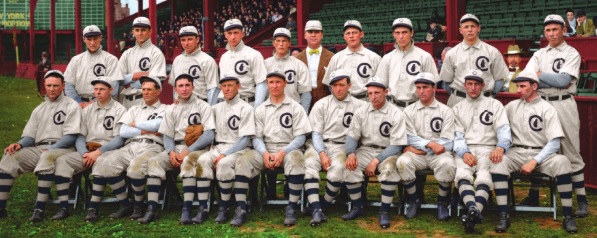
|
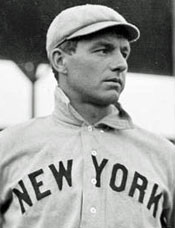
Joe McGinnity
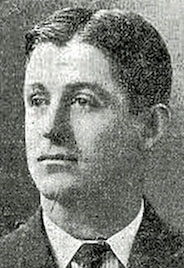
Jim Johnstone
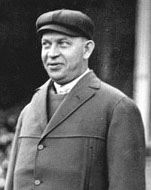
Bill Klem
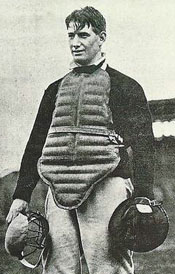
Roger Bresnahan
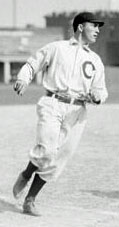
Jimmy Sheckard
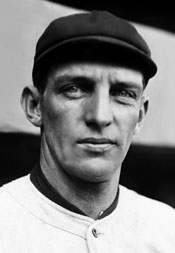
Frank Schulte
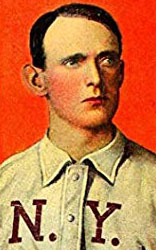
Fred Tenney
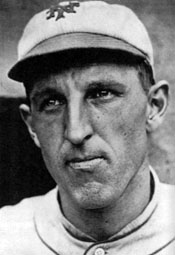
Buck Herzog
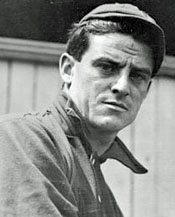
Mike Donlin
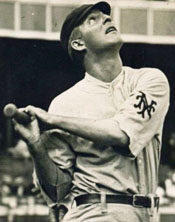
Cy Seymour
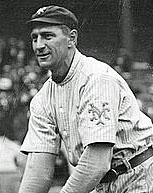
Art Devlin
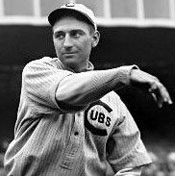
Solly Hofman
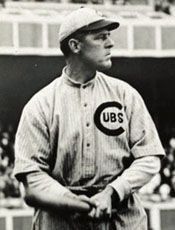
Harry Steinfeldt

Solly Howard
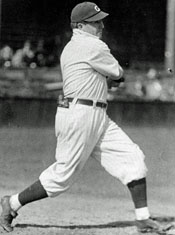
Joe Tinker
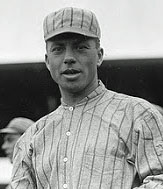
Moose McCormick
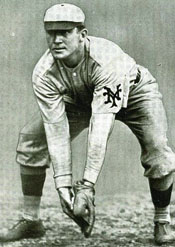
Al Bridwell
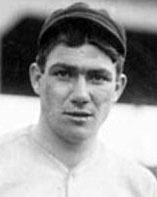
Larry Doyle
|
|
|